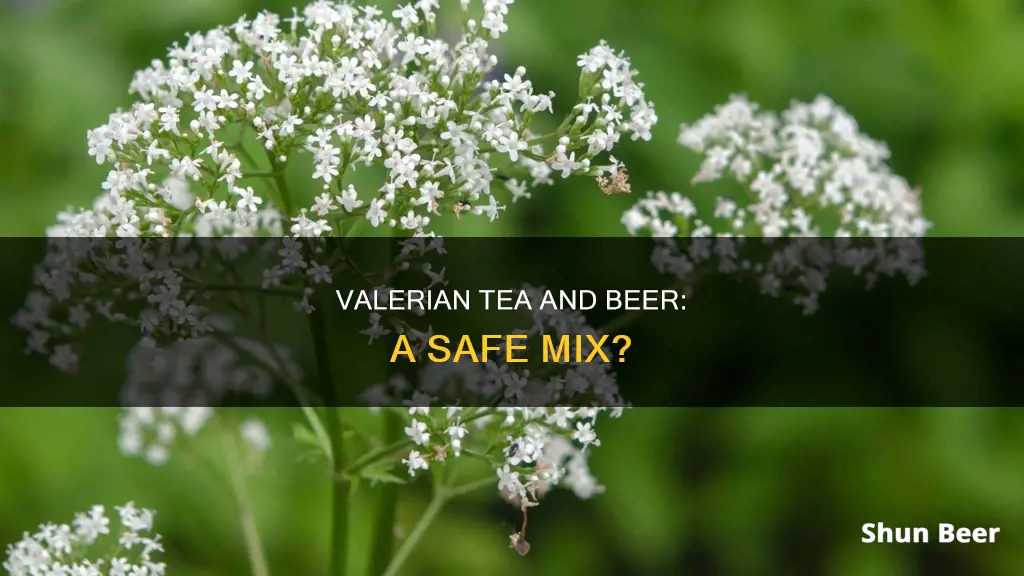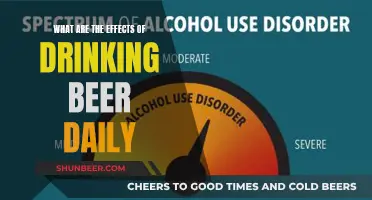
Valerian is a popular herbal remedy for insomnia, anxiety, and nervous restlessness. It is considered safe and gentle, and is often preferred over prescription medications for sleep problems. However, valerian has sedative properties, and when combined with alcohol, it may cause hazardous levels of sedation. Both valerian and alcohol are central nervous system depressants, and their combined effect can lead to excessive sleepiness, impaired breathing, and even death in rare cases. Therefore, it is generally advised not to mix valerian and alcohol to avoid adverse health risks.
| Characteristics | Values |
|---|---|
| Should you drink beer if you had valerian tea? | No |
| Reason | Both are sedatives, so the combination may cause hazardous sedation. |
| Other substances to avoid with valerian | Benzodiazepines, sleep medications, most psychiatric medications |
What You'll Learn

The dangers of combining valerian and alcohol
Valerian is a popular herbal remedy for anxiety and insomnia. It is considered safe for most adults and is often preferred over prescription medications because it is believed to be gentler and have fewer side effects. However, it is important to exercise caution when consuming valerian, especially when combined with alcohol or other sedatives.
Valerian and alcohol are central nervous system (CNS) depressants, which means they slow down the activity of the nervous system. When taken in appropriate doses, they can cause sleepiness, slower breathing, and general sedation. However, when combined, they can lead to excessive sedation and impaired breathing, posing a potential risk of death.
Precautions when taking valerian
The effects of valerian on the body can be amplified when combined with other sedatives, such as sleep medications, benzodiazepines, antidepressants, and opioid pain relievers. While valerian is generally considered safe, it is important to consult a healthcare professional before use, especially if you are taking any other medications or supplements.
Alcohol and its effects on anxiety and insomnia
Alcohol does not help with insomnia and anxiety; in fact, it can make these conditions worse over time. While initial consumption may seem to alleviate symptoms, regular alcohol use can lead to increased sleeplessness, anxiety, and depression. Therefore, it is generally recommended to use herbal remedies or medications prescribed by a doctor to address these issues effectively and safely.
In conclusion, while valerian is a popular and relatively safe herbal remedy, it is important to avoid combining it with alcohol or other sedatives due to the potential risks of excessive sedation and impaired breathing. Always consult a healthcare professional before taking valerian, especially if you are taking any other substances, to ensure your safety.
The Magic of Beer Bread: How Does It Work?
You may want to see also

Valerian and alcohol are central nervous system depressants
The combination of these two central nervous system depressants can cause a person's breathing to become seriously impaired, and in some cases, it may even lead to death. Therefore, it is recommended to avoid or limit alcohol consumption when taking valerian. It is also advised to refrain from activities that require mental alertness, such as driving or operating heavy machinery, until you know how valerian affects you.
Furthermore, valerian is likely safe when used short-term, but the safety of long-term use is unknown. Some common side effects of valerian include dizziness, drowsiness, headache, stomach upset, mental dullness, and vivid dreams. It is important to consult with a healthcare professional before using valerian, especially if you are taking any other medications or have any health conditions.
Beer and TURP Surgery: What You Need to Know
You may want to see also

The effects of valerian on sleep
Valerian is a flowering plant native to Europe and Asia that is now also grown in North America. It has been used as a medicinal herb since ancient Greek and Roman times. The roots of the plant are crushed and dried to make valerian tea, which is often combined with other herbs. The tea is commonly used as a sleep aid, to treat anxiety, and to ease menopause symptoms.
Valerian root has mild sedative properties and can cause drowsiness. It is generally considered safe for short-term use by most adults, but the safety of long-term use is unknown. It is recommended that valerian not be taken with alcohol or other sedatives, as the combination may cause hazardous levels of sedation.
Beer and Allergy Medicine: Safe Mix?
You may want to see also

The side effects of valerian
Valerian is considered safe for most adults for short-term use. However, it is not recommended to consume alcohol while taking valerian due to their similar effects as sedatives. The combination may lead to hazardous levels of sedation and impaired thinking and judgment.
- Dizziness and drowsiness: Valerian can cause sleepiness and drowsiness, which may be amplified when combined with alcohol. This can impact activities that require alertness, such as driving or operating machinery.
- Stomach upset: Some people may experience stomach discomfort or upset after consuming valerian.
- Headache: Headaches have been reported as a side effect of valerian consumption.
- Mental dullness: Some individuals may experience mental dullness or impaired concentration and judgment when taking valerian.
- Vivid dreams: Valerian may lead to more vivid dreams or nightmares for some people.
- Withdrawal symptoms: Long-term use of valerian may result in withdrawal symptoms when discontinued. It is recommended to gradually reduce the dose over time to avoid these symptoms.
- Pregnancy and breastfeeding: Although valerian is considered likely safe for short-term use, there is limited research on its effects during pregnancy and breastfeeding. It is generally advised that pregnant and nursing women avoid taking valerian.
- Paradoxical reaction: Some individuals may experience a paradoxical reaction to valerian, feeling anxious and restless instead of calm and sleepy.
- Drug interactions: Valerian may interact with certain medications, including sedatives, anticonvulsants, benzodiazepines, and drugs for insomnia and depression. It is important to consult a healthcare professional before combining valerian with any medication.
- Liver function: Valerian may affect liver function and how it breaks down certain drugs. This can potentially change the effects and side effects of those medications.
Drinking Beer at the Qatar World Cup: What's Allowed?
You may want to see also

Safety precautions when taking valerian
Valerian is a flowering plant native to Europe and parts of Asia, and it is now also found in North America. The root of the valerian plant is used to make valerian tea, which has mild sedative properties. It is used as a sleep aid and to treat anxiety and menopause symptoms.
- Avoid alcohol consumption: Both valerian and alcohol are sedatives, and consuming them together may cause hazardous levels of sedation. Alcohol can also increase the nervous system side effects of valerian, such as dizziness, drowsiness, impaired thinking and judgment, and difficulty concentrating.
- Consult a healthcare professional: Before consuming valerian, especially if you are taking any other medications or supplements, speak with a healthcare professional. Valerian may interact with certain liver enzymes and impact how quickly certain drugs are broken down in the body.
- Pregnancy and breastfeeding: There is limited research on the safety of valerian for pregnant and breastfeeding individuals. It is recommended to stay on the safe side and avoid using valerian during these periods.
- Caution for children: Valerian is possibly safe for children when taken by mouth appropriately for 4-8 weeks. However, it should not be given to children without consulting a doctor first.
- Surgery: Valerian slows down the central nervous system, and anesthesia and other medications used during surgery can also affect the central nervous system. Therefore, it is recommended to stop taking valerian at least two weeks before a scheduled surgery.
- Potential side effects: Common side effects of valerian include dizziness, drowsiness, headache, stomach upset, mental dullness, vivid dreams, and excitability. Some people may also experience paradoxical reactions, feeling anxious and restless after taking valerian instead of calm and sleepy.
- Withdrawal symptoms: Using valerian for long periods may lead to dependence and withdrawal symptoms when discontinued. To avoid withdrawal symptoms, it is recommended to reduce the dose gradually over a week or two before stopping completely.
- Avoid activities requiring alertness: Valerian can cause drowsiness and impair mental alertness. Avoid driving, operating heavy machinery, or engaging in other activities that require alertness until you know how valerian affects you.
- Drug interactions: Valerian may interact with certain medications, including sedatives, anticonvulsants, benzodiazepines, and tricyclic antidepressants. It is important to consult a healthcare professional before combining valerian with any other substances.
- Long-term use: The safety of long-term valerian use is unknown. Most studies have focused on short-term use, and there is limited data on the potential risks of long-term valerian consumption.
Drinking Alcohol-Free Beer: Publicly Legal or Not?
You may want to see also
Frequently asked questions
No, it is not safe to drink alcohol after consuming valerian tea. Both substances are sedatives and can cause hazardous levels of sedation when combined. This can lead to impaired breathing and even death.
Combining valerian tea and alcohol can lead to excessive sleepiness, impaired thinking and judgement, dizziness, and difficulty concentrating.
The long-term effects of consuming valerian tea are unknown. While it is generally considered safe for short-term use, there is limited research on its effects when used for extended periods.
Yes, pregnant and breastfeeding individuals are advised to avoid valerian tea due to a lack of data on its safety for these populations. Additionally, children under the age of three should not consume valerian tea as its potential risks have not been evaluated for this age group.







